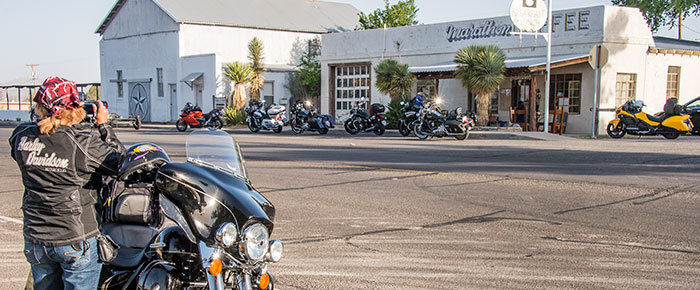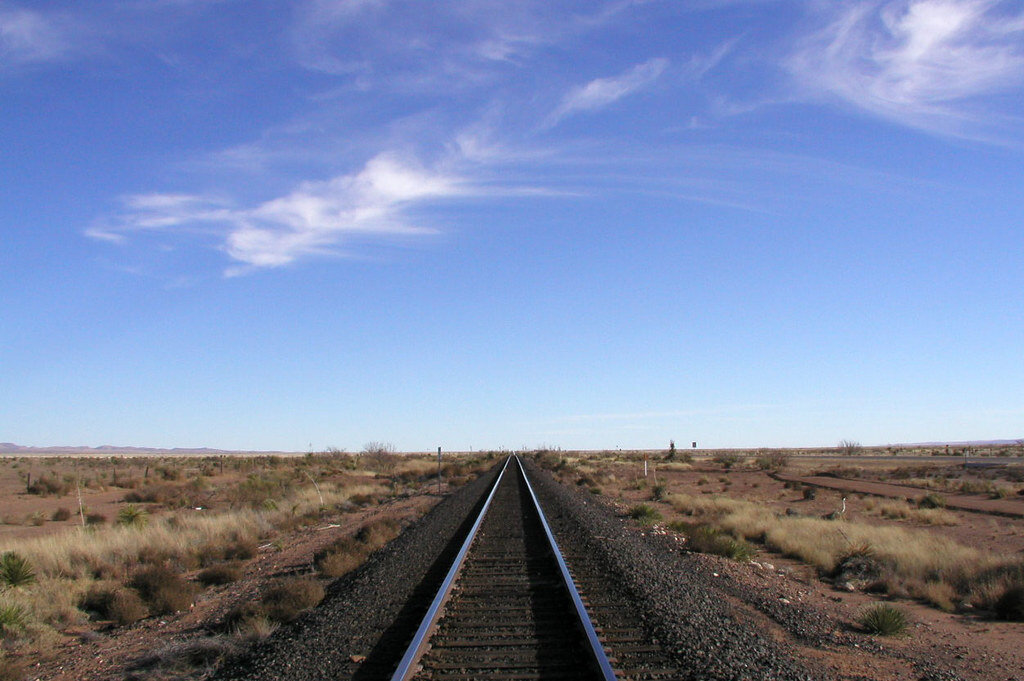Marathon to Marfa
Fifty miles seems like a long way in most places. Out here in West Texas, it's just a hop, skip and jump. In a fifty mile stretch of the West Texas desert, two uniquely different little towns co-exist: Marathon and Marfa.
In both places, handkerchiefs are commonly worn, and not just as protection against the unrelenting dust storms rolling in from the west. In Marathon, folks wear their hankies on their heads as a sort of “do-rag” or “biker bandana”—part of their Harley riding uniforms. In the other town, Marfa, hankies are face coverings for COVID-19 protection.
Besides being ineffective in both of these purported uses, these handkerchiefs also seem to represent a certain inauthenticity, a fading cultural icon.
The Gage Hotel in Marathon is both expensive and extremely popular with the Harley motorcycle crowd. There they arrive on their gleaming piles of chrome, resplendent in leather, tats, and trophy tee shirts from Sturgis, each head topped with the requisite hankie. I understand that this accoutrement must be useful as hair protection underneath a sweaty helmet after a long day’s ride. but it is also a political statement—one perhaps not so much about party affiliation, but more as “this is who I want you to believe I am.” Therein lies the rub for me. It was quite clear that many of these folks were lawyers and accountants. In fact, in my last trip through Marathon, I think I saw my CPA in the corner of the White Buffalo Bar, trying his best not to make eye contact while sipping his double tequila ranch water with his motorcycle “gang” friends.
Even months ago on my early summer trip, no COVID-19 masks were worn in this barn, or anywhere else on the premises of the Gage. It was as if the pandemic had never happened, or was long gone. Neither, of course, are accurate. Yet, here they all were, rags on heads, nothing on their face.
The desert breach between Marathon and Marfa is a chasm. It’s less than an hour’s drive through complete emptiness, yet a world away when it comes to the fullness of human imagination. Marfa is an arts and culinary center, a verifiable outpost of the coastal elites, an imported worldview plopped down in the middle of Texas nowhere. Upon arrival I noticed two things right away. The subject matter of the tats here was all woo-woo, cosmic, neo-flowerchild, whereas in Marathon, the “bikers” were repping patriotic and “power” symbols. The second difference was the preferred mode of transportation. If Marathon’s favorite set of wheels is a Harley, Marfa’s is a high-end Range Rover (with custom wheels).
Then there were more hankies. Marfa-ites appeared to prefer wearing them on their faces. They were not the same exact bandanas as Marathon, where preference heavily leaned towards a Stars and Stripes pattern. Rather in Marfa, the hankie prints were either cutesy or artistic, worn around one’s neck in a fashionable way when dining, then donned as their form of covid protection when entering a lobby or restaurant foyer, and of course, when walking alone down the deserted streets of downtown Marfa. All done in a way, seemingly similar to the Marathon bikers, to say something slightly political, announcing, “This is who we are.”
And in a direct mirror contrast to the attitude of Marathon, where they acted as if COVID-19 never arrived, in Marfa they seemed to act as if it would never leave.
Anachronisms can appear in many forms. There is the “past past,” and the “not letting it go ahead and pass” past.
Connecting these two towns is the dual string of a highway and some railroad tracks. Woven together like the strands of historic, cultural, and commercial DNA that they truly are, the old Southern Pacific railroad, and US Highway 90 cling together like an old married couple lovingly holding hands as they make their way through this harsh desert. There is an odd comfort in seeing them together at all times, no matter the terrain, as you travel from Marathon to Marfa.
Besides being co-capitals of Nowhereland, Marathon and Marfa have another thing in common. They are preferred destinations for those of us running away. Out there, folks try to forget who they were, with mighty expressions of who they wish for us to believe they currently are. They strive to recreate themselves, but like the train tracks and the road, their past and present are still holding hands, traveling in parallel.
I don’t mean to imply that I am just a fly on the wall, observing, but not participating. Like the faux-bikers in Marathon and the ultra-cool “arteests” in Marfa, I too am wearing something in hopes of making everyone believe “this is who I am.” My cover story for this trip was a long vacation, but I too was running away. From my full time job, from the fear and restrictions of everyday life due to the global pandemic, from all that has set upon the world like a heavy fog over the past two years. American road trips have always represented escape, so I was using this most conventional form of escapism to explain it all to myself. Ostensibly, this was about backing away from my everyday world so as to view it from a new angle, perhaps with a bit better focus, like fidgeting with the knob on a pair of binoculars.
At this point in my journey, my focus had been about my life in the past tense. What had occurred and what to make of it. Only the smallest amount of time and thought had gone into what was next. Let’s just call it a seven-day-long personal inquiry on four wheels, racing at 80 miles per hour over an empty two lane highway through nowhere, but definitely on my way to somewhere, wherever the hell that might be.
West Texas is like a big sponge. There’s plenty of sky out there to absorb whatever it is we wish to discard, and there’s plenty of land to soak up whatever spills out.
On our way to Marathon, we passed through the town of Uvalde, home of John Nance Garner, VP to Franklin Roosevelt during the depression. Garner once said, “Any old jackass can kick down a barn, but it takes a craftsman to build one.” In that same way, I sense that any old jackass can flee, and don a bandana—whether on his head or around his face.
But it takes a craftsman to build the new barn to house our near future.
Imagine those craftsman of the Southern Pacific Railroad and its subsequent partner Highway 90. Though many of the men who laid the tracks were immigrants, they were not fleeing. They did not proceed just to create the vehicle for my current flight. They were forging a new route, one that generations could take and experience as part of their own journeys. They were crossing the same desert as I, yet I imagine their sense of purpose and self as they made this crossing may have been different. Purpose and self, like the train track and the highway—they carry us forward into unknown places and the unbuilt dream.
West Texas can also be a big, bold, blank canvas—a great empty cloth, just waiting to be revealed in all of its beautiful, absorbent nothingness. I have been staring for a year and a half at the old canvas—the one painted with stark strokes of a world in fear. This new, great empty canvas appeals to me. I am looking for new tubes of paint in more vibrant colors, with which to paint my new future. I do not wish to dwell in the past, nor revisit its old, and scary image. I am running away from all that and making room for new images, new futures, and new unknowns.
Place and dream are meant to be unknown at first, so that they may be discovered, and we ourselves with it. At the point where I crossed the state line into New Mexico, north of El Paso, the train tracks and the road diverge to go their separate ways as their journey to California continues. The horizon stretches so far, so much further than I could have ever imagined back in Texas. It’s as if I could see the curvature of the earth in front of me, but I cannot see beyond the horizon. That’s okay. As Isak Dinesen once wrote, “ God made the world round so we would never be able to see too far down the road.”



